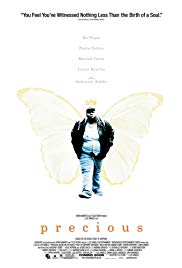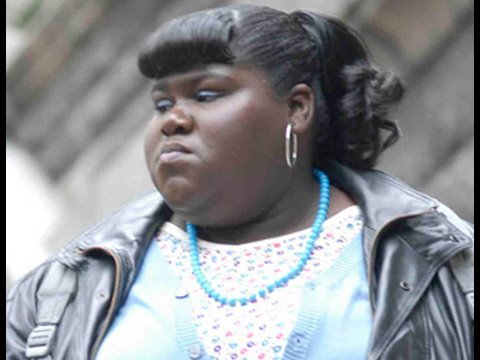1. This story took place in the 1980s. Had Precious lived today, how would the child welfare system and the criminal justice system have reacted to her situation in ways that are not shown in the film?
Suggested Response:
See the section on “Before Watching the Movie”.
2. In which scenes is Precious shown dissociating?
Suggested Response:
All of her fantasy scenes. One example is the scene in which she is being raped by her father and bursts through the ceiling into a world in which she is a celebrity.
3. This story has many important themes. Identify two major themes of the story.
Suggested Response:
Students will formulate the themes in their own way. The substance is what is important. Students may also see additional themes in the film. The following suggestions are not in order of importance. They may overlap.
A.
You are ultimately in control of your own life and you can build your own self-esteem.
B.
It is never too late to take control of your life and be the person that you want to be.
C.
People don’t choose their family or their circumstances in life, it’s what you make of the hand you were dealt that is the source of self-respect.
D.
If nurturing love cannot be found at home, it can be found in other places.
E.
A good and caring teacher can change a life.
F.
A person who others ridicule for being overweight, ugly, damaged, or different is still a person worthy of understanding and respect. The college student who played Precious in the movie, Gabourey Sidibe, was referring to this theme when she said, “I know this girl [Precious]. I know her in my family, I know her in my friends, I’ve seen her, I’ve lived beside this girl. . . . I didn’t want to be friends with those girls because they had too much drama going on in their lives. I feel guilty for having ignored them.”
G.
Some people, like Mary, are simply malevolent and damaged beyond repair. All you can do is to remove them from your life.
H.
Parents are responsible for protecting their children, no matter how difficult it may be. Mary utterly failed in her duty to nurture Precious.
4. What is the significance of the names of the major characters in this story? Look for irony.
Suggested Response:
Until Ms. Lichtenstein came to the front door of Precious’ building and spoke to her through the intercom, everyone treated Precious like she was anything but precious. (Even her favorite math teacher did very little for her.) In that way her name is ironic. It was not until Precious started to take care of herself by going to the alternative school that she began to live up to her name. Only then did people start to treat her like the jewel that she was. There is also irony in the mother’s name. “Mary” is the name of the mother of Jesus and in Christian tradition she is the loving, nurturing force of the universe. However, the Mary in this movie is just the opposite. Finally, Blue Rain is the name of the teacher whose love and attention help Precious bring her strength and beauty to full flower. That is the essence of rain, which nurtures the plants on which all life is based.
5. At the end of the movie, Mary schedules an appointment with the social worker in which she tries to explain herself. First, Precious and then the social worker get up and leave. Was Mary simply evil and irredeemably broken as a human being? Or were Precious and the social worker wrong to reject Mary’s request for understanding? Also, under what circumstances, if any, would you advise Precious to try to reconcile with Mary later in life?
Suggested Response:
There is no one correct response. A good discussion will include the following positions.
-
- The argument that Mary was Simply Evil and that Precious was Right to Leave and Should Stay Far Away from Mary: Adults have obligations to protect children and Mary simply failed to fullfil that duty. In fact, she actively hurt Precious and used Precious for Mary’s own selfish needs. According to Mary, the sexual abuse began when Precious was three years old. There is no way that a child of three or for that matter a child of ten or fifteen can protect herself (or himself) from abuse by an adult. Mary also cheated the government and used Mongo for that purpose. Mary also intimidated her own mother and forced the older lady to cooperate in the deception of the government. There is, in fact, no element of Mary’s personality that shows any positive or redeeming feature. For Precious, the only way to protect herself from Mary is simply to leave. The social worker’s first responsibility was to Precious and she was correct to leave as well and to refrain from taking any further steps to get mother and daughter together. In fact, a strong argument could be made that all Mary really wanted out of the interview with the social worker and Precious was for Precious to come home so that Mary could get a welfare check again.
-
- The argument that Mary Should Be the Subject of Understanding and Compassion and that Precious, at Some Time in the Future, Should Give her Mother Another Chance: Much of the evil in this family was caused by the rapist-father Carl. When he rejected Mary in favor of Precious, he caused Mary to hate her own daughter. In addition, part of the reason that Mary hated Precious was Mary’s own guilt that she had not protected her daughter from the father’s sexual abuse. Mary couldn’t face that guilt and it was easier to think that Precious had no worth. Were Mary to admit her own failings, go to therapy, and truly repent, there is an argument that Precious should allow Mary a chance to be close to her daughter.
-
- Synthesis: The description of the psychological mechanisms that were working in Mary do not excuse Mary’s conduct. Mary was the adult, the mother, and she had obligations to her daughter that she did not fulfill. Whether Mary, with a lot of therapy, could reform and find a way to redeem herself would really be up to Mary. People have done worse and redeemed themselves. In any interaction with Mary, Precious must fulfill her own responsibilities to her children by making sure that Mary is never in a position to hurt them.
6. How should Precious explain his parentage to Abdul? Should she tell him the truth?
Suggested Response:
There is no one correct answer. One argument would contend that the truth is always better. Abdul needs to be taught that we don’t choose our parents, we choose who we become; we don’t choose our circumstances in life, we choose what we make of those circumstances. What Abdul needs to know is that his mother loves him and that she seized control of her life and made the best of her circumstances. Another position might be that if the secret could be kept, then it would be better to lie. If the secret could not be kept, then it may or may not. It might depend upon the whether during the period that the lie was maintained Abdul could develop enough self-respect to weather the disclosure if the truth came out.



